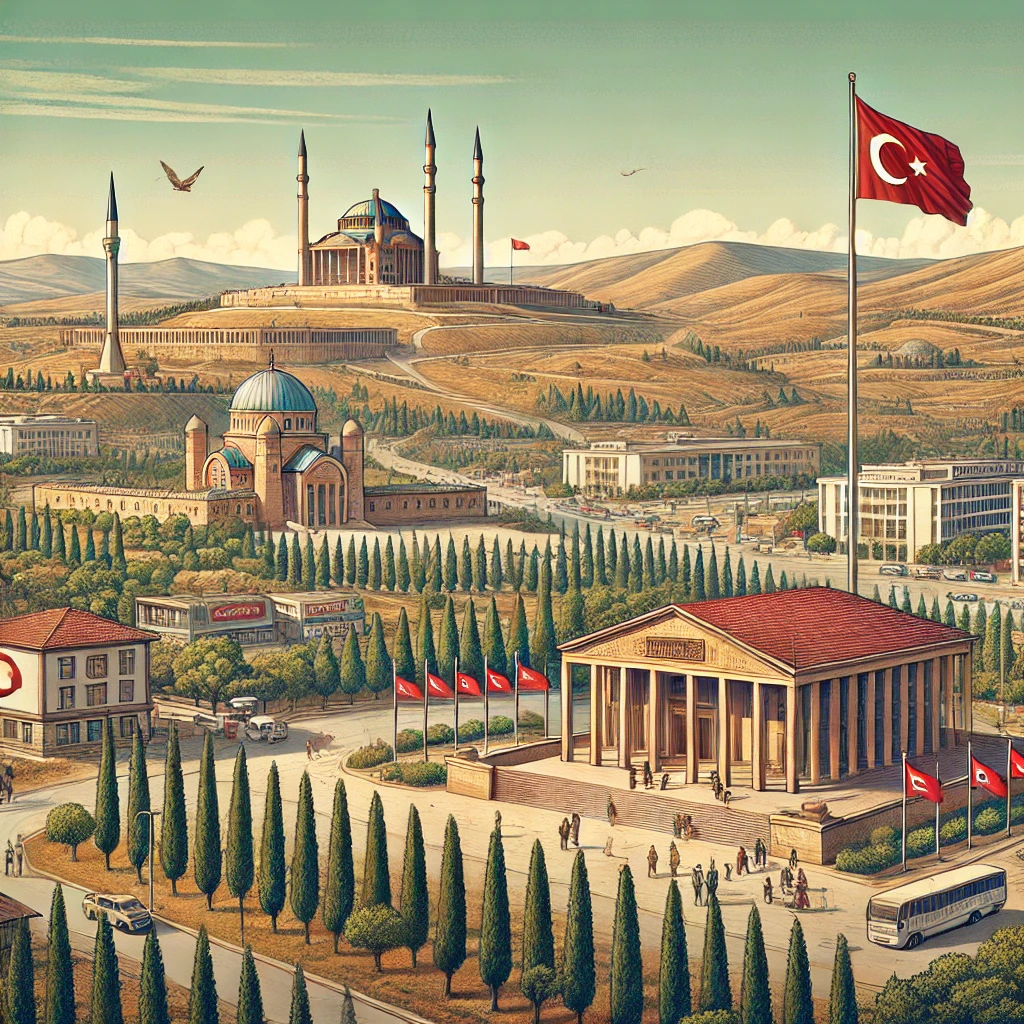Çankaya, one of the central districts of Türkiye's capital, Ankara, holds a special position in the political, social, and cultural life of the Republic of Türkiye due to both its administrative structure and symbolic importance. Located in the south of Ankara, Çankaya hosts many strategic and symbolic structures such as the Grand National Assembly of Türkiye, Ministries, embassies, universities, and Anıtkabir. Rapidly developing with the Republican era, the district has become Ankara's administrative and intellectual center.
Geographical Location and Physical Structure
Çankaya is situated on a large plateau reflecting the characteristic features of the Central Anatolia Region. The average altitude of the district is 1,070 meters. Its topographical structure reflects Ankara's general physical appearance, consisting of gently rolling hills, plains, and valleys. While green areas are found in the western and southern parts of the district, building density is quite high. Atatürk Forest Farm, Dikmen Valley, and various parks, which serve as urban forests, represent the limited natural areas in the district.
Climatically, typical continental climate features are observed. Summers are hot and dry, and winters are cold and occasionally snowy. High temperature differences have also led to a steppe-like vegetation cover.
Historical Background
The historical past of Çankaya is directly related to the historical development of Ankara. Archaeological research conducted in the region has revealed settlement traces belonging to the Hittite, Phrygian, Roman, Byzantine, and Seljuk periods. In this context, Çankaya's history can be traced back to the 2nd millennium BCE.
With the beginning of the Republican period, Çankaya became the administrative center of Türkiye. Especially Çankaya Mansion, which Atatürk used as his residence, elevated the district to a privileged position in political memory. Shaped by the settlement of public institutions starting from 1923, the district became one of the first examples of modern urbanization in Türkiye.
Anıtkabir and Symbolic Structures
Çankaya hosts Anıtkabir, one of the symbolic structures of the capital Ankara. Built between 1944 and 1953 as the monumental tomb of Mustafa Kemal Atatürk, Anıtkabir is an important structure in Turkish architectural history, reflecting the style of its era. This monument, designed by Emin Onat and Orhan Arda, is of great importance not only for its commemorative function but also for national unity and identity. The Atatürk and Turkish War of Independence Museum is also located within the Anıtkabir Complex.
Çankaya Mansion served as the first presidential residence of the Republic of Türkiye for many years. Today, it symbolically continues its function in certain ceremonies and reception organizations.

Visual Containing the Architectures of Çankaya (Produced with Artificial Intelligence)
Population and Socioeconomic Structure
As of 2023, Çankaya has a population of approximately 940,000, making it Ankara's most populous district. The majority of the population consists of university graduates, public personnel, and professional occupational groups. It has an education level above the Türkiye average.
The household structure is predominantly based on the nuclear family model, although the student and single working population is also high. Due to the presence of numerous universities, academic centers, cultural institutions, and diplomatic representations in the district, its demographic structure is highly diverse.
Economic Life
The economic structure in Çankaya is largely based on the service sector. Industrial activities in the district are limited; however, public administration, diplomacy, education, health, and culture-arts fields are highly developed. Hundreds of embassy buildings and foreign representations operate in the district.
While universities, law firms, NGOs, national and international organizations guide the district's economy, cafes, restaurants, boutiques, and shopping centers are areas where the service sector integrates with daily life. In addition, neighborhood markets and local tradesmen contribute to a lively economic activity in the district.
Cultural and Artistic Life
Çankaya is at the heart of Ankara's cultural life. The district has numerous theaters, art galleries, concert halls, museums, and cultural centers. Institutions such as Doğan Taşdelen Contemporary Arts Center, Yılmaz Güney Stage, and Nazım Hikmet Culture and Arts Center host cultural events with exhibitions, theater plays, and concerts throughout the year.
Furthermore, cultural and art festivals regularly held in the district, and academic events with national and international participation, play a role in reinforcing the city's identity. Exhibitions and performances are frequently organized in public spaces to make art accessible.
Educational and Scientific Institutions
Çankaya hosts numerous universities, including long-established educational institutions such as Middle East Technical University (METU), Hacettepe University (Beşevler Campus), and Ankara University (Tandoğan and Cebeci Campuses). Additionally, various research institutes, private educational institutions, libraries, and science centers are located in the district.
In this respect, Çankaya is a central hub for both academic and cultural production. It is also one of Türkiye's most dynamic districts in terms of student density.
Cultural Heritage and Historical Fabric
Despite modern urbanization, Çankaya harbors historical structures and cultural heritage elements from various periods. Fountains, cemeteries, mosques, and stone structures remaining from the Ottoman period, along with early architectural examples of the Republican era (e.g., Ministry buildings and early public structures), are part of this heritage.
Çankaya Mansion is not only an architectural structure; it is also a symbolic place that witnessed Türkiye's recent history, where decisions were made. Additionally, various street names, monuments, and sculptures in the district reflect Türkiye's historical and cultural memory.
Origin of the Name
There are different views regarding the origin of the name "Çankaya". According to a common interpretation, it is thought to have taken its name from the "bellflower" (Campanula species) naturally growing in the region. The fact that this plant, known for its purple, bell-shaped flowers, was recognized by the local people, may have been the source of the naming. An alternative view suggests that the name originated from "Çang," one of the Oghuz tribes. Although both views are found in popular narratives, they are not supported by definitive documents.


